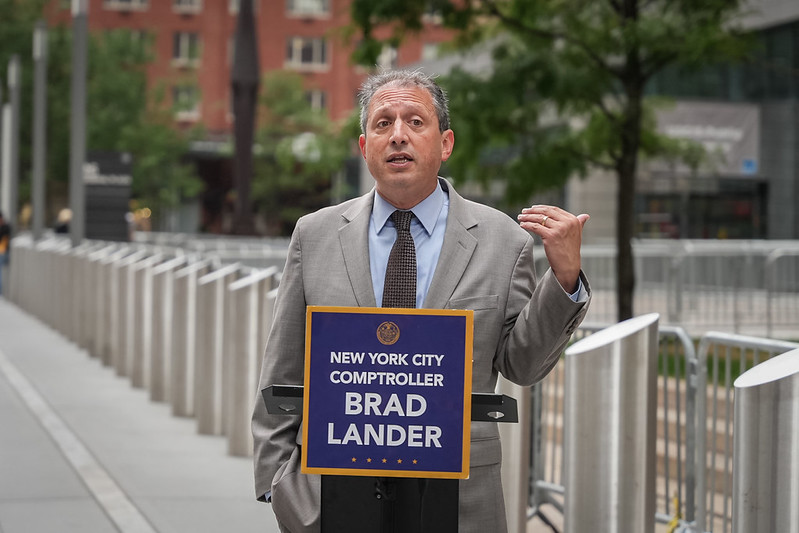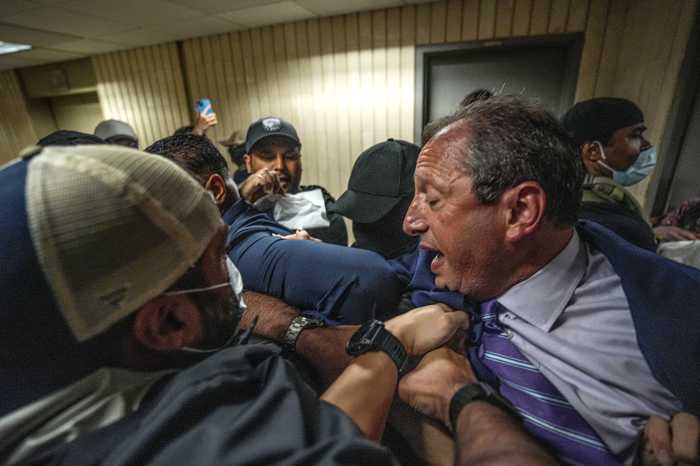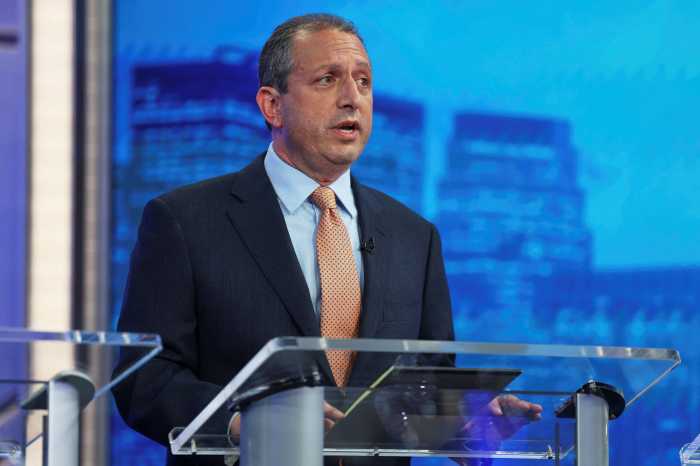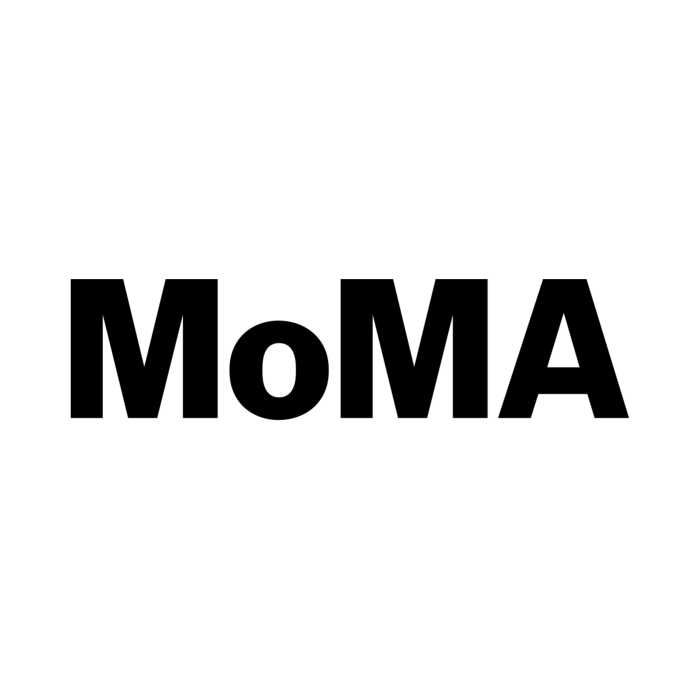City Comptroller Brad Lander has approved the Adams administration’s contested new self-funded health plan for municipal workers after determining the contract met all procedural requirements, his office announced Friday.
The contract for the NYC Employees PPO plan, also known as NYCE PPO, administered by EmblemHealth and UnitedHealthcare, was officially registered on November 13, clearing the final administrative hurdle for a plan slated to replace the long-standing GHI CBP/Anthem Blue Cross Blue Shield coverage for approximately 750,000 active workers and retirees. The new plan is scheduled to take effect Jan. 1.
Lander’s office emphasized that the comptroller’s review is limited to whether the procurement followed the rules, not the substance of the plan itself. Officials said the Office of Labor Relations complied with all public-notice and competitive-procurement requirements, including soliciting proposals, scoring finalists, and seeking best-and-final offers before selecting vendors. The estimated administrative fee for the self-insured contract is $950 million over its base term and any subsequent renewals.
The registration comes days after a Manhattan Supreme Court judge rejected a bid by HandsOffNYCare, an advocacy group opposing the overhaul, as well as several workers and retirees, to block the contract. The group sought a temporary restraining order to prevent the City from replacing its insured GHI plan with the self-funded NYCE PPO, but Justice Lyle Frank denied the request on Nov. 6. A full hearing is scheduled for Dec. 1, when additional arguments will be heard.
The lawsuit argues the self-insured structure violates the City Administrative Code, which requires coverage through licensed insurers that assume financial risk. The City maintains the new plan preserves premium-free coverage, expands provider access, and will generate major savings. OLR estimates the shift will reduce costs by about $900 million in the first year through provider discounts and plan management.
During its review, the comptroller’s office posed a series of due-diligence questions to OLR and noted that unlike a previous Medicare Advantage contract it declined to register in 2023, the pending litigation in this case did not prevent the office from verifying compliance with procurement rules.
HandsOfNYCare, which formed this summer and has run an aggressive ad campaign opposing the plan, said it will continue its legal fight. The group argues the switch exposes workers and retirees to financial and medical risk because the City will pay claims directly and can change benefits at any time.
Following the ruling, Wanda Williams, board member of HandsOffNYCare, said the group look forward to presenting “our full arguments to the court at our hearing on December 1.”
“We are deeply concerned that the City is rushing to put through a new plan that removes key state-law protections for workers, retirees, and their dependents. This process has been conducted without transparency or meaningful input from the people it will affect. Our suit seeks to protect the more than 750,000 New Yorkers who depend on reliable health insurance,” said Williams.
The group did not offer a comment on Lander’s decision Friday.
City officials counter that the new PPO plan is the best option for more than a million employees, retirees and dependents. The provider network will include adequacy guarantees setting minimum provider counts and in-network claim percentages.
“We are glad to hear that the contract for our new health plan was registered today and that we have now finalized the procurement process for this plan,” Mayor Adams spokesperson, Liz Garcia, said. “Our plan will strengthen coverage, expand provider access, and deliver substantial savings, all while maintaining the premium-free coverage and continued high-quality care our employees expect and deserve. We are confident that this is the best choice for nearly 1 million employees, pre-Medicare retirees, and their dependents.”
Michael Mulgrew, President of the United Federation of Teachers and Executive Vice-Chair of the Municipal Labor Committee, which approved the plan in September, told UFT members that Judge Frank’s decision to deny the temporary restraining order in the lawsuit” indicates the case lacks merit.”
“We remain confident that the NYCE PPO plan will take effect on Jan. 1 as scheduled,” Mulgrew wrote in a message to UFT members.
The comptroller’s office said that of more than 60,000 contracts reviewed during Lander’s tenure, fewer than 1% have been returned for failing to follow proper procedures.
The case for and against the shift
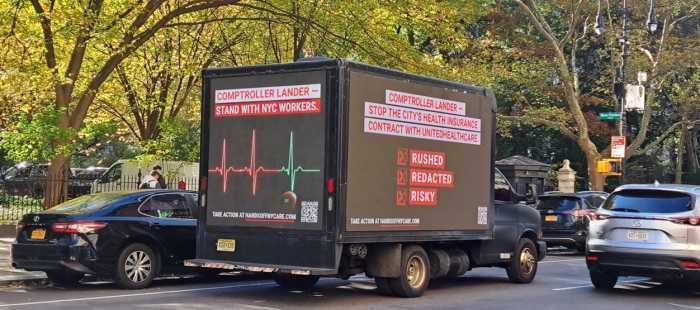
Opponents of the NYCE PPO plan, led by the advocacy group Hands Off NY Care, have staged an aggressive campaign against the shift. The group hired a mobile LED truck to circle the comptroller’s office ahead of his decision, and its lawsuit includes affidavits from workers and retirees who say the change threatens their health and financial security.
George Anderson, a clinical advocacy director and father of two, said he fears losing access to his children’s doctors in New Jersey because the city has yet to provide clear information about the new provider network.
Migdalia Acevedo, who worked near Ground Zero after 9/11 and continues to struggle with related medical issues, told the court she is rushing to complete a hip replacement in 2025 before the switch takes effect. “If the City runs out of money, we will run out of healthcare,” she said.
Another plaintiff, Samy Mahmoud, who has Crohn’s disease and requires costly infusions, said he is “one automatic denial away” from financial ruin if the city delays paying claims under the self-funded model.
Retirees also raised concerns about losing what they describe as promised lifetime benefits. Raeann Singleton, currently in treatment for uterine cancer, warned that “even a temporary lapse in coverage could cost [her] life.”
Supporters of the plan submitted their own affidavits describing years of difficulty accessing care under the current GHI-CBP system and praising the expanded provider network promised under NYCE PPO.
Stuart Levine, a retired NYPD lieutenant who lives near Tampa, said he has struggled for years to find in-network specialists for his son, who has Type 1 diabetes. He said his family has repeatedly had to pay out of pocket for essential care because so few Florida providers accept GHI-CBP.
“The broader network promised by the NYCE PPO plan would change my family’s life for the better,” he wrote.
Susan Parker, a retired city teacher now living on Florida’s west coast, described traveling more than an hour to Tampa for thyroid cancer treatment because no local specialists accepted her insurance. She said she routinely hears the same complaints from other pre-Medicare retirees she represents as a regional coordinator for the UFTs’ retiree chapter.
Parker said she and many of her members are “extremely excited” for the expanded network under the new PPO. Blocking the plan, she wrote, “would create real and immediate burdens” for retirees who have been unable to access care close to home.
Richard Freedberg, a retired NYC teacher who now lives in Gettysburg, Pennsylvania, attested that he and his family have struggled to access care under the current GHI-CBP plan. Freedberg, who retired in 2021 after 25 years teaching math and science in East Harlem, said while the plan worked well in the city, providers outside New York often do not accept it.
Since moving to Gettysburg in February 2025, he said he has been unable to find a local general practitioner who takes GHI-CBP coverage, and has not even begun searching for specialists like cardiologists. His wife has faced similar challenges, according to Freedberg, who said the family has been forced to choose between going without care or traveling hundreds of miles back to New York to see providers who accept the insurance.
Freedberg also cited a previous incident in Montana, where he broke a rib and was unable to find a provider that accepted GHI-CBP, paying about $2,000 out of pocket. His 25-year-old daughter, who lives in Nashville, Tennessee, also had to travel to New York City for major surgery because she could not find coverage locally.
He said the NYCE PPO plan, with its expanded provider network, would address these challenges and ensure his family can access necessary medical care. “If the NYCE PPO plan is not implemented, I am very concerned that my family and I will not be able to get the medical care we need because of the restrictive network provided under the current GHI-CBP plan,” Freedberg wrote in his affidavit.



